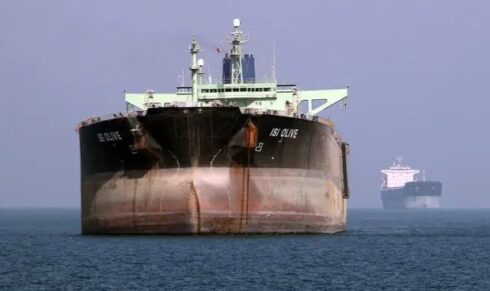Written by Uriel Araujo, researcher with a focus on international and ethnic conflicts
Jonathan Yerushalmy, Guardian’s Australia’s UK/US site editor recently wrote on how the trade in oil from nations currently under Western sanctions, such as Russia and Iran has boomed – China plays a huge role in that and the US-led political West is “turning a blind eye” to it so as to maintain a high oil supply globally. Yerushalmy writes that “oil is taken from Russia, Iran or Venezuela to meeting points in South-east Asia and transferred from tanker to tanker, where it is then relabelled as coming from a nearby oil producer, before it is shipped on to China.” According to the journalist, “this trade is going on with the full knowledge of the Biden administration, who have prioritized diplomatic overtures with Iran over enforcing their own sanctions.”
In the first half of 2023, China imported record volumes of crude oil and, according to the US Energy Information Administration (EIA), during this period, “imports from Malaysia increased 330,000 b/d (46%) to 1.0 million b/d in the first half of 2023.” The import volume, however, “exceeded total production in Malaysia.” Analyses indicate, the EIA report adds, that “much of the oil shipped from Iran to China was relabeled as originating from countries such as Malaysia, the United Arab Emirates, and Oman” so as to avoid sanctions.
Similarly, the watchdog group United Against a Nuclear Iran (UANI) reports that, in August, Iranian oil exports reached levels not seen since 2017, dispatching an average of two million barrels of oil per day during the first 20 days of the month – this being an over 30% increase in comparison to previous months. According to the group, which estimates that 91% of such oil was exported to China, the major factor accounting for this boom is “the relaxation of sanctions enforcement by the Biden administration, particularly to China.” This sanctioned oil also helps to reduce oil prices internationally (without Iranian and Russian oil, oil prices in the US would be higher), which might also be an extra motivation for the Biden administration, considering upcoming elections.
The phenomenon described by Yerushalmy and other observers, however, has a deeper dimension to it. “Isolating” a Great Power such as Russia is no simple task by any means. The fact that Western economic warfare against Moscow (in the shape of sanctions) has largely backfired is, by now, acknowledged by most analysts. And, not only that, but it also had the “side effect”, from a Western perspective, of boosting Eurasian integration: in February I wrote on how the International Monetary Fund (IMF) expected Russian crude oil export figures to remain strong. Moreover, there has been a rise in Russian trade in general with neighbors and regional partners and allies. In Armenia, for example, according to Ana Swanson, who writes on international trade for the New York Times, smartphone exports to Russia have boosted – the same trend applying to computer chips, and various other products from states such as Turkey Kyrgyzstan, and Kazakhstan. Chinese exports to Russia too reached a record high, already in December 2022 – moreover, products from Western companies are reaching the Eastern Slav country too, while being allegedly “rerouted” through central western Asia nations and other former Soviet republics. It is not just oil.
Such trade trends pave the way for geopolitical developments, as well, as there have increasingly been proposals to further expand Eurasian integration, be it through the framework the Eurasian Economic Union (EAEU), the Collective Security Treaty Organization (CSTO) or other means. Armenia, for instance, plays a key role in connecting the EU and the EAEU, and recent developments in Armenia, as I’ve written, must be seen in the context of Western pressures for “alignmentism” – against the current of non-alignment and multi-alignment.
As for Iran, it is an emerging power that should also not be underestimated. Its 2021 full admission to the Shanghai Cooperation Organization’s (SCO) gave it much needed international acceptance, among other things. Like Moscow, Tehran is a target of US sanctions (which was already the case in 2021) and so both nations have been cooperating on a number of multilateral and bilateral activities. The North-South Transit Corridor (NSTC), for instance, albeit a nascent initiative, has the potential not only to counter American initiatives to isolate both countries economically, but also to create a new promising route and even an alternative to the Suez Canal, thereby making the Persian nation once again the regional transit hub it always was historically, as I wrote in November last year.
China-brokered Iranian-Saudi rapprochement, in addition, which has the potential to be a game-changer for the Middle East, keeps advancing, albeit slowly: in early September, both countries exchanged ambassadors.
Washington’s much talked recent deal with Tehran to free American citizens under arrest is part of a larger American-European joint effort to de-escalate tensions with Iran and reach an informal understanding with it. In the same manner, US recent “relaxed sanction enforcement” has to do with such efforts and also with the larger geoeconomic context.
In today’s incredibly tense world, any Western de-escalation with the Persian nation is a fortunate development. The Caesar Act, in any case, is still employed by Washington against actors in the region such as Syria, as part of today’s economic warfare and its “fuel wars”. Any “informal understanding” with Iran can buy some time, but won’t solve the problems that also involve its regional partners, as they reflect deep systemic and geopolitical tensions.
In any case, the hard truth is that there is no easy alternative to oil globally – and the world needs Iranian and Russian oil.






